Time tracking sounded like overkill. But seven days in, I had receipts for every wasted hour and some hard truths about how I live. The problem wasn’t time—it was how I filled it.
How I Tracked Every Hour of My Week
I wanted to make this experiment simple. I’ve seen plenty of apps that allow you to add fancy tags and customizations, but I felt that was overkill. Moreover, I knew from previous experiences that I wasn’t going to visit the app and track my time.
Instead, I made a simple spreadsheet in Google Sheets. I created tabs for each day and then added two columns: Time and Activity/Activities. In the latter, I wrote everything that I did within that hour. I didn’t bother tracking every single minute, as that would’ve been exhausting, but where needed, I added how long I spent.
I marked my spreadsheet as a favorite in Google Drive so I could easily refer to it. I’ve noticed that I’m more likely to access documents I mark as starred rather than bookmarking them in my browser, so this was an easy way to not forget.
What I Learned Tracking Every Hour of My Days
I learned much more than I expected after tracking my entire week. It’s been one of the most effective experiments I’ve conducted for self-awareness, and I can imagine that someone who’s never done this before would see even greater benefits.
1. Mornings Determine Most of My Day’s Success
Tracking every hour of my week revealed the importance of protecting my mental energy. Each time I pick up my phone and check my notifications first thing in the morning, the rest of my day is an uphill task. Even if I don’t have any messages, allocating mental bandwidth alone is detrimental.
I stopped checking my emails before noon long ago, but I realized that I had to take things further. Before giving anyone else attention (whether virtually or in real life), I need at least an hour to myself. I already woke up earlier than everyone in my house, so I didn’t need to change my wake-up time—but I did have to block social media and messaging apps.
However, I also know that I’m not going to be 100% perfect. So, I created a contingency plan in case I get distracted. Going for a walk always resets my mind, so I’ve made a pact with myself to get outside if I fall off track.
2. Thursday Is My Most Vulnerable Day
This experiment showed me that I was most likely to get distracted on Thursday, which is my main rest day.
Since I effectively have two extra hours, I feel like I don’t need to be as focused on my tasks. I fill the remaining time with distractions, such as checking sports websites and overanalyzing statistics. Ironically, I often get less done on Thursdays than when I have fewer work hours.
3. My Weekends Were Surprisingly Productive
I’ve never focused much on what I do on my weekends because tracking everything for 365 days a year wouldn’t be sustainable for me. This was the first time I’ve tracked my weekends, and I was surprised that they were relatively productive.
I have a strict “no laptops” policy on the weekend because I need my brain to reset for the week. Every time I work on the weekend, brain fog clouds my entire next week. My Saturday mornings are currently taken up by language classes, but after that, I plan to move my afternoon run into that time slot.
While I did “unproductive” things like following sports, these helped my brain focus on something else. When Monday rolled around, I was ready to work hard again. I actually like doing chores, too, because I feel like I’ve fully reset after doing them.
4. Doing Fewer Things Makes Me More Productive
I achieved a lot in my twenties, but I realized toward the end of the decade that brute-forcing my way toward each goal wasn’t sustainable. Moreover, I hated the process, which I’m pretty sure slowed my progress.
Overfilling my to-do list has always been the biggest culprit, but since turning 30, I’ve worked on being an essentialist. Spending less time on my computer has yielded better results, which this experiment confirmed.
5. Scheduling Social Time Is a Good Idea
I’m quite introverted and enjoy alone time, so ignoring the importance of social connection is easy. Well, it’s easy until I inevitably start to feel like something is missing a few weeks later.
When tracking my week, I noticed my happiest days were when I had more social time. I join classes at the gym partly to outsource my motivation, but also because I can speak to like-minded people. Similarly, spending time hanging out with people at my coworking space made me more productive.
6. Trying to Save Time Isn’t Always Good
I’ve often noticed that when I try to save time or money, I end up with less of both. I have several theories why, but it probably has something to do with a scarcity mindset. When I tried removing things that were good for me but not tied directly to money, my days were always worse.
Being an essentialist is important, and limiting low-leverage tasks is a good idea. However, trying to save time for the sake of it has never served me well—and this experiment confirmed that.
7. The More I Move, the Better My Results
I always thought that sacrificing your health to achieve something was pointless until I started doing it (which then confirmed I was right). Whether 10,000 daily steps is scientifically proven or not is irrelevant; I feel better when I average 10,000 steps per day.
Similarly, skipping a workout to meet a deadline is pointless. I would’ve completed the task more efficiently and done a better job if I had first gone to the gym. Humans were designed to move, and my quality of life is significantly worse when I ignore that.
8. Willpower Is Overrated
I sometimes don’t enforce restrictions on bad habits, such as checking my phone, because I want to prove how disciplined I am. But willpower is limited, and when it runs out, doing things I’m not supposed to do is very easy.
While productivity “gurus” might not like to hear this, I’d rather remove the distraction and focus on the original task. If I have to block every website apart from Google Docs, so be it.
How I’ve Made Changes Since Running This Experiment
I didn’t take drastic changes as I’ve already spent many years optimizing my life, but my small adjustments have made a big impact so far.
1. Moving My Phone Charger Away From My Work Desk
I already charge my phone outside my room so I can fall asleep more easily, and I leave my device on my work desk. But since one of my Deep Work blocks is in the morning, I’m taking a huge risk. If I wake up one morning and am not feeling motivated, reaching for my device is very easy.
To stop this from happening again, I’ve put my phone charger on the dining table. After experimenting, I’ve found this spot in my house to be where I’m most likely to check it. I’m allowed to check my phone after breakfast for the first time, but not before then (and not until I’ve written at least one article).
2. My Thursday Action Plan
Rather than trying to work more on Thursdays, I replaced my gym time with photography. Besides making time for my biggest hobby, I also guarantee that I reach 10,000 steps for that day. The walk to my coworking space is scenic, too, so I always find something interesting to capture.
I keep my Deep Work blocks consistent, too, in addition to leaving at the same time I normally would. If I finish my daily tasks earlier, I can either leave early or edit some photos in the remaining time.
3. Making Movement a Priority
After averaging around 5,000 steps the month before this experiment, I stopped pretending that ignoring movement would lead to better results or wellbeing. Movement is now, apart from sleep, my top priority.
Some non-negotiables I’ve added to my schedule are:
- At least 10,000 daily steps (including on weekends).
- A minimum of four CrossFit workouts per week, unless my body is genuinely exhausted.
- Running once per week. It doesn’t matter if it’s on Thursday or the weekend, as long as it’s done.
- Walk for a minimum of 15 minutes after lunch.
Many of these feed into each other, and since I averaged 10,000 daily steps the year before tracking my week, I already had a baseline.
Having a smartwatch helps significantly. I like how my Apple Watch makes me move more every day, with daily rings and challenges.
Will I Continue Tracking My Entire Week?
While this experiment was useful, I don’t think that I’ll continue tracking my whole week. I’ve already discussed how time-blocking doesn’t work for me, and I feel tracking my entire week would have diminishing returns over time. The point of doing so was to understand how I was spending my time, which I now do.
However, I’ve also got years of experience in optimizing my time. I’ve already cut a lot of waste from my days, such as deleting social media accounts that don’t serve me. If I were a beginner, I would continue tracking my week for at least 1-2 months.
I’m also quite self-aware, and if I notice myself falling back into old traps, I’ll run this experiment again. It’s a useful part of my toolkit if needed, rather than being a go-to.


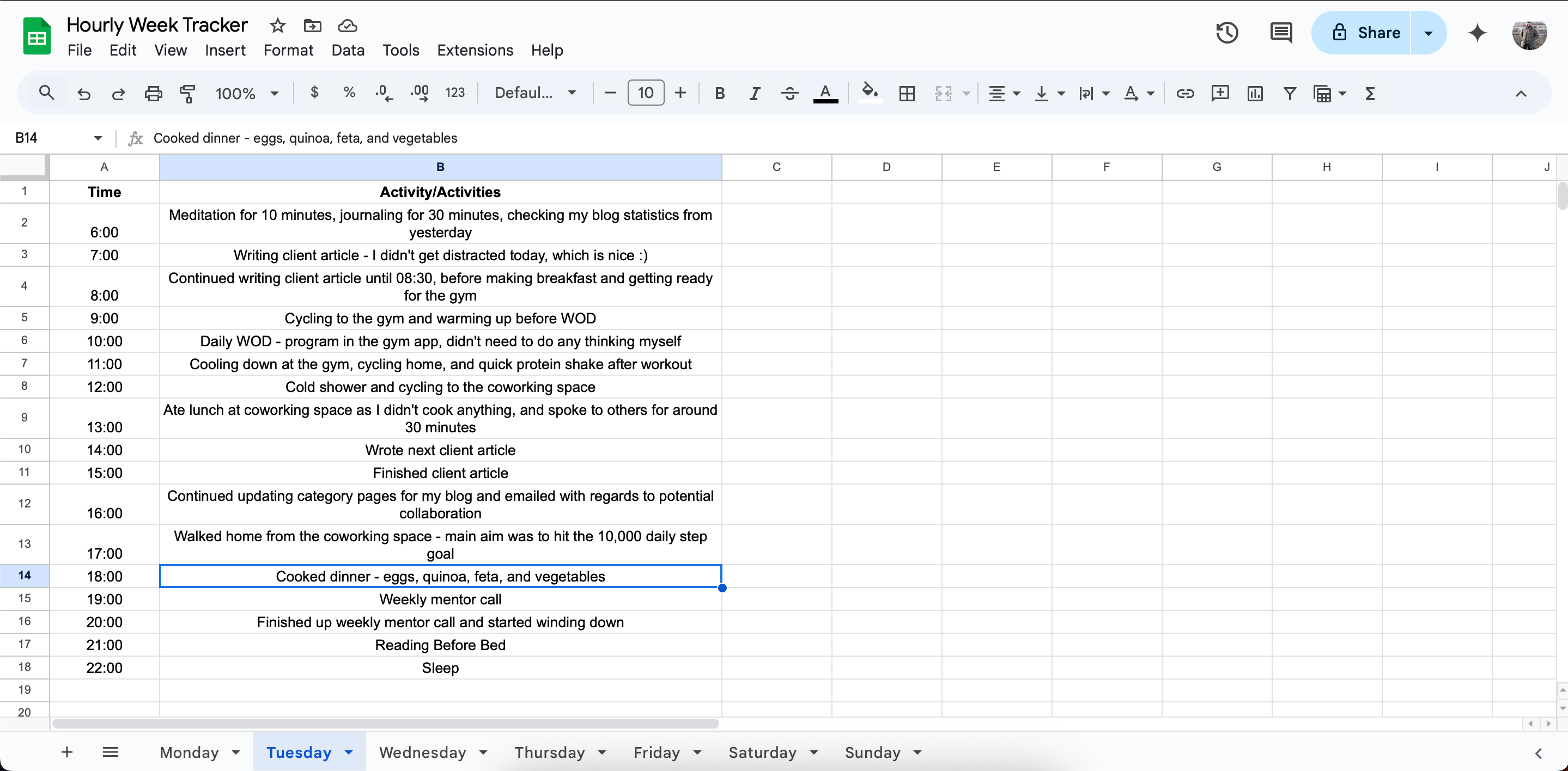
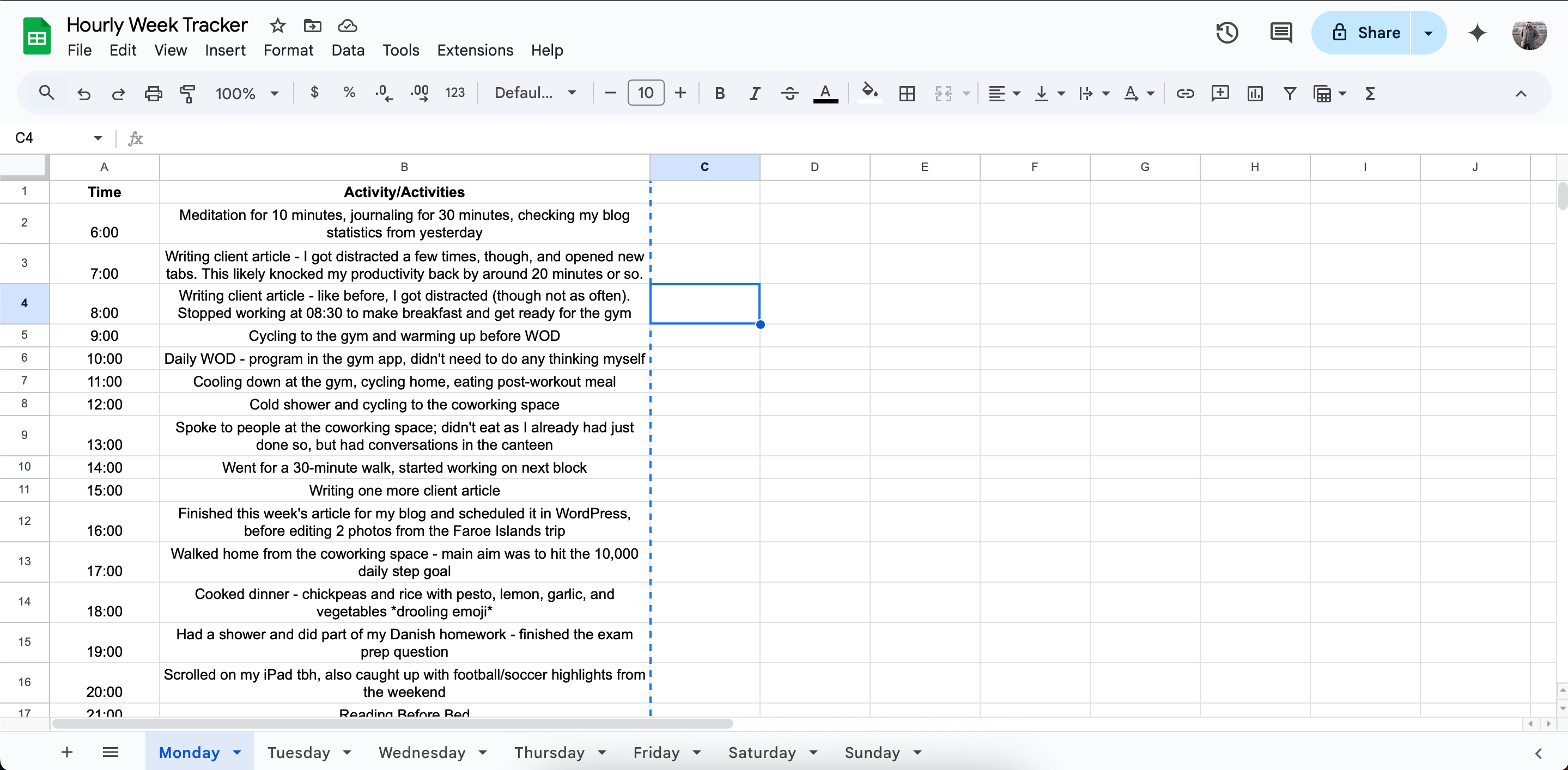
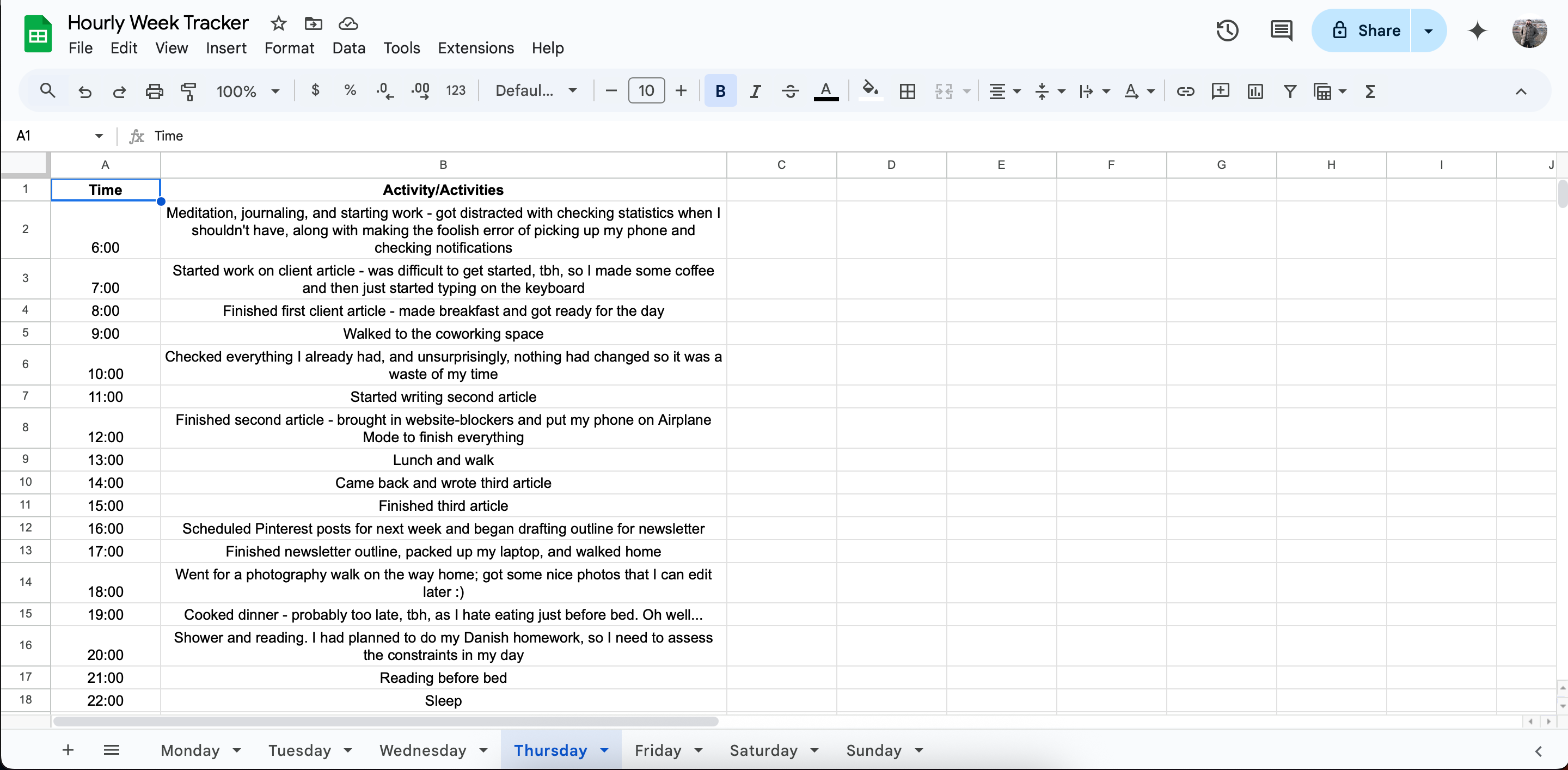
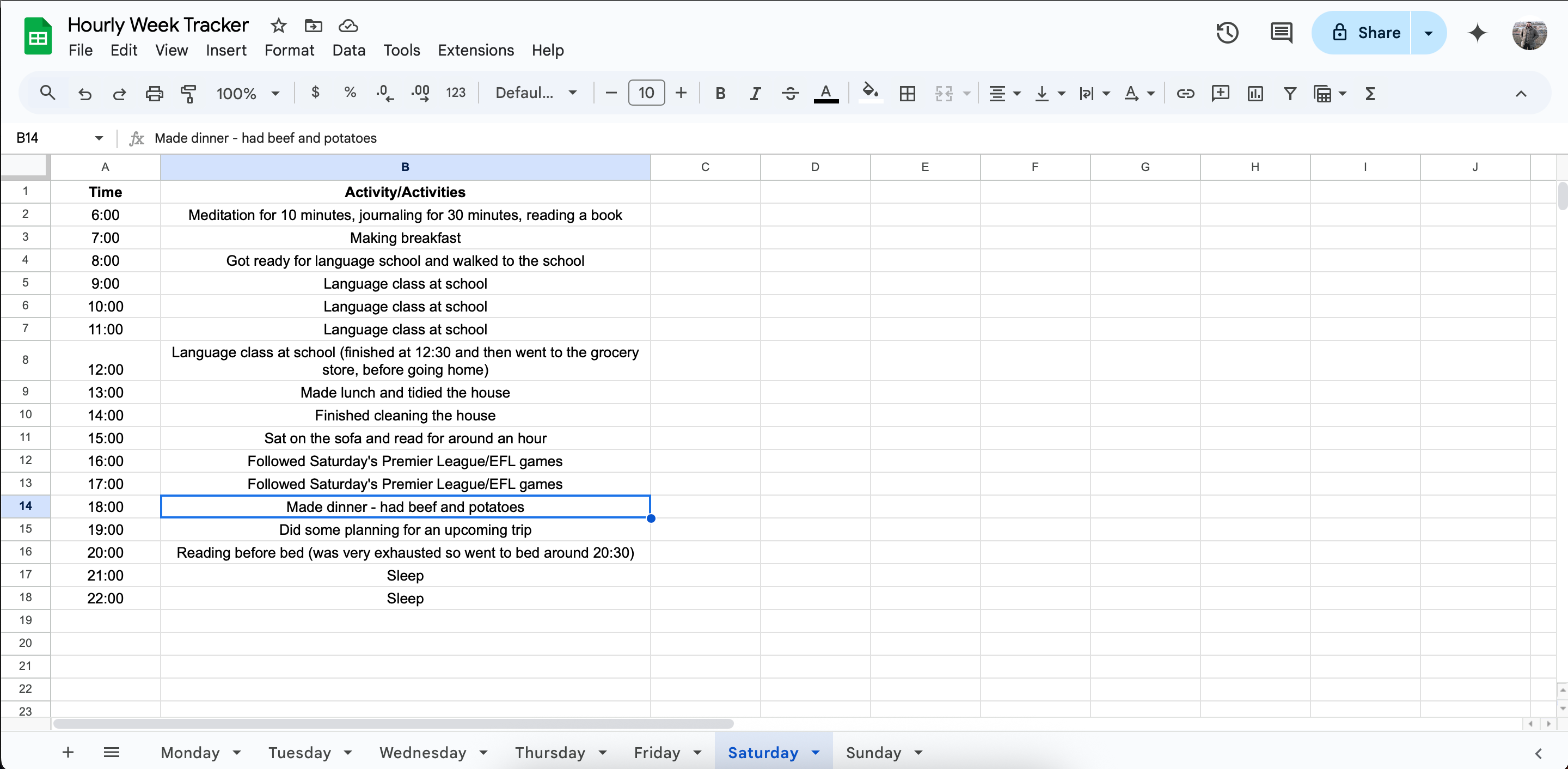
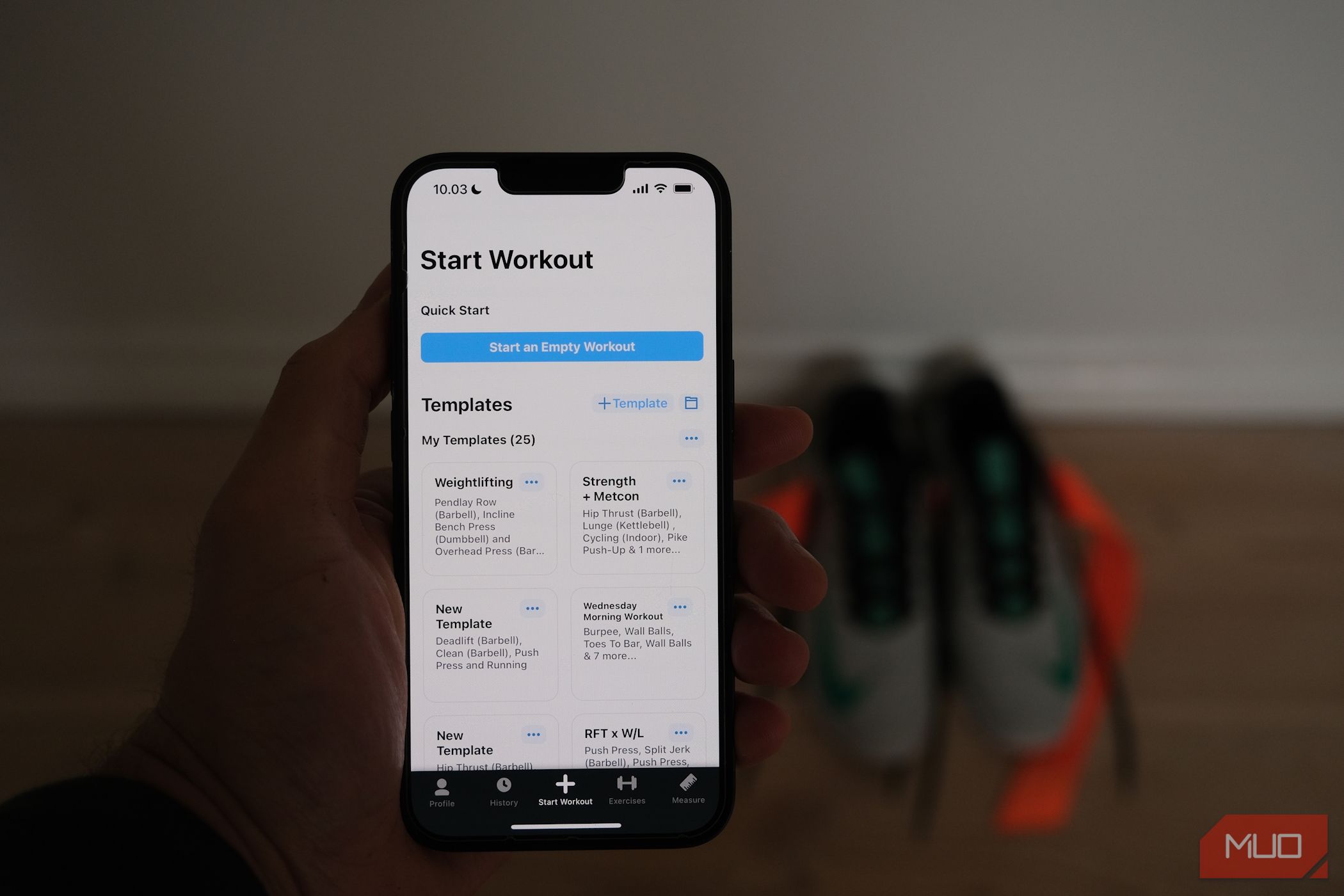
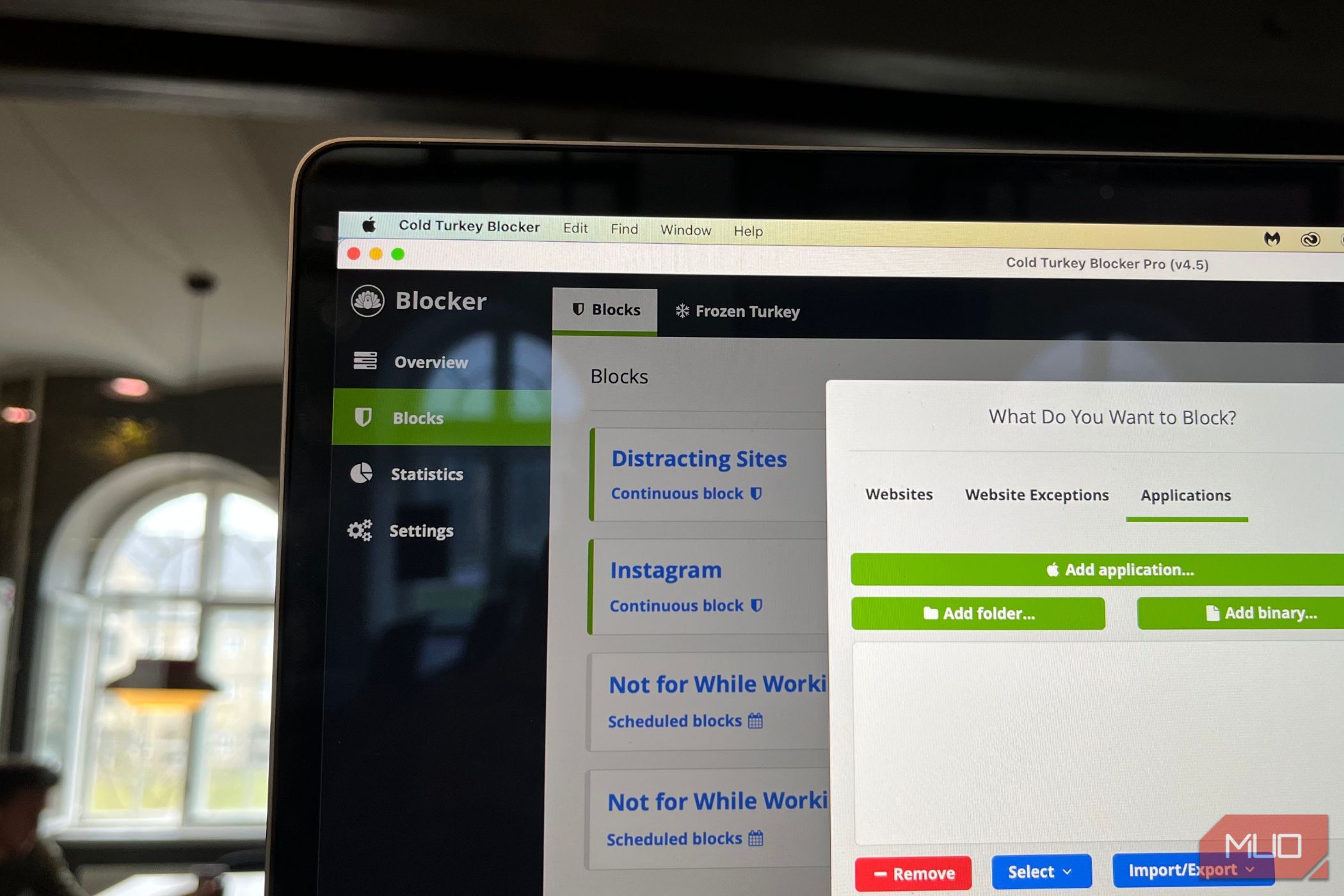
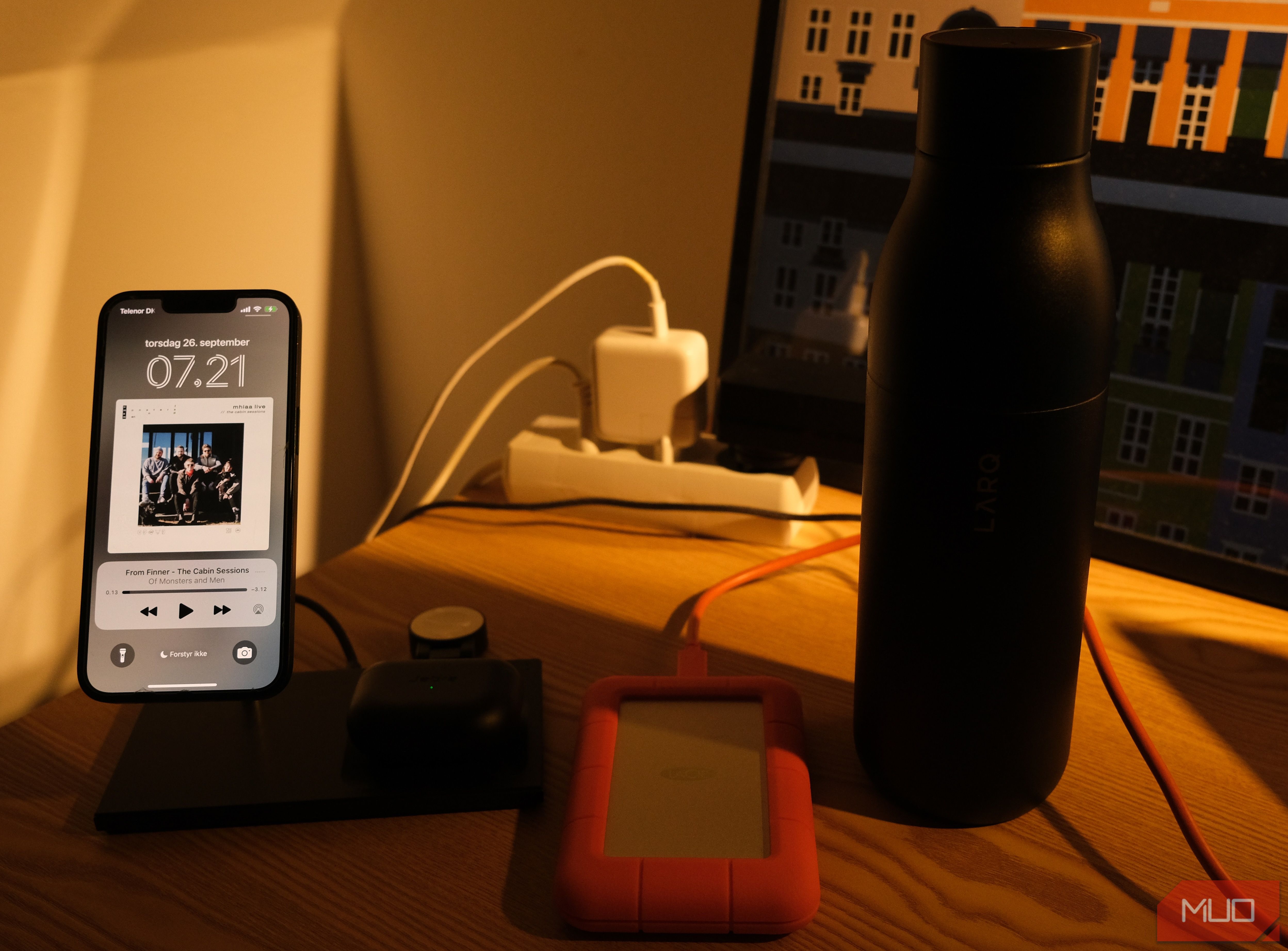






Leave a Comment
Your email address will not be published. Required fields are marked *